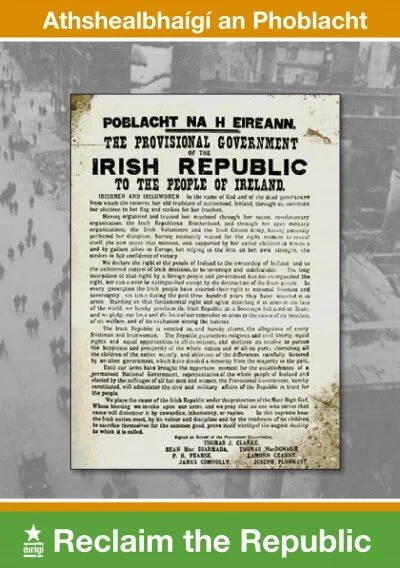What The Proclamation Means To Me: Two New Contributions Added
As part of its “Reclaim the Republic/Athshealbhaígí an Phoblacht” campaign Éirígí has asked a number of individuals to contribute to a collection of writings on the theme of “What The Proclamation Means To Me”. The contributors come from a variety of backgrounds including the Arts, Journalism, Trade Unionism, Political and Community Activism.
Éirígí is delighted to add contributions from:
Ciarán Ó Brolcháin (James Connolly Debating Society)
Traveller Women (Pavee Point Traveller Organisation)
Read their contributions below -
“What The Proclamation Means To Me”
By Ciarán Ó Brolcháin (James Connolly Debating Society)
It is undoubtedly an embarrassment that a 90-year-old document laying out a blueprint for a better Ireland remains unfulfilled. That almost every political party in Ireland harks back to the leaders of the 1916 Rising and to the Proclamation of the Irish Republic read by Pádraig Pearse on the steps of the GPO on Monday 24th April 1916 makes it even worse. (What was it James Connolly said about apostles of freedom again?)
There is also however, much hope in that the Proclamation still acts as a source of inspiration for those unhappy with the status quo and working towards changing society for the better, as was the case with the seven signatories over 90 years ago.
The document is just as relevant today as it was when printed on the eve of the Rising. All you have to do is make a checklist of the objectives still to be achieved: do equal rights and civil and religious liberty exist for the people of Ireland? Are the children of the nation cherished equally?
An interesting question arises from this same section of the Proclamation when viewed in the current context of immigration into Ireland. “The Irish Republic is”, they stated, “oblivious of the differences carefully fostered by an alien government, which have divided a minority from the majority in the past.” But, today we have the Dublin government fostering division between the native-born people of Ireland and those who come here from abroad to live, work and raise their families. Would the signatories of the Proclamation consider both governments in Ireland today as alien?
Perhaps it is unfair to ask such a question and run the risk of twisting the document in a way that was never intended (or perhaps not in the case above, when you consider that Connolly and Thomas Clarke were not born in Ireland). There can be a tendency among some, especially socialists, to give the Proclamation a red tint and nowhere is that more clearly seen than with the sentence “We declare the right of the people of Ireland to the ownership of Ireland”.
This is why I, personally, believe that we must take another document into consideration whenever we review the 1916 Proclamation.
The Democratic Programme of the First Dáil, or Clár Oibre Poblacánaighe, can in many ways be considered a sister document to the Proclamation of the Republic. It continues the message of the Proclamation, the first line of the English-language version repeating that “We declare in the words of the Irish Republican Proclamation the right of the people of Ireland to the ownership of Ireland”, but it goes on to quote Pearse’s dictum that “all right to private property must be subordinated to the public right and welfare.”
Many people tend to overlook the 1919 Democratic Programme, but those of us who stand firmly within the socialist republican tradition should do what we can to see that it is not forgotten, because it adds immeasurably to the skeleton framework of the Proclamation of the Irish Republic. Both documents together are an indictment of the establishment of the Free State and the moderates, and they act as a further inspiration as we strive for a truly free Ireland.
An Phoblacht Abú.
“What The Proclamation Means To Me”
Pavees Na hÉireann
What the Proclamation Means to Us
Proclamation Means to Me
And the Pavees of Ireland
Victory over discrimination in
Every county of Ireland and that of
Every Ethnic minority
Strikes for our Freedom
Of Human Rights
For Pavee men, women and children
Insults of the government who took away our
Rights of freedom to travel
England gave back the freedom of 26 counties to Ireland but we the Travellers were
Left out unwanted
And forgotten about
No one cares about our culture, traditions or beliefs
Don’t ever think we will be assimilated
Written by the Traveller Women – Culture and Heritage Programme. Pavee Point Traveller Organisation

